 Flash back to the Roaring Twenties, when America was amid Prohibition: Booze was banned, stealthy speakeasies adorned Tacoma, and the Paramount Theatre sat in Tacoma’s Proctor District, which in 2016 became Peaks & Pints bottle shop, taproom, and eatery. Prohibition, the law that prohibited the sale, manufacture, and transportation of alcohol in the United States, was ratified as the 18th Amendment on Jan. 16, 1919, and went into effect on Jan. 16, 1920. Dec. 5, 1933, passage of the 21st Amendment, brought an end to Prohibition. You might think there are already enough reasons to party in December. You might think there are enough holidays prominently featuring the consumption of alcoholic beverages. You would be wrong. The anniversary of the day Prohibition was repealed, today, is fast becoming a favorite holiday. We think that deserves a beer. In fact, we think that deserves five beers. Cheers to Repeal Day and our Peaks and Pints Beer Flight: Repeal Day.
Flash back to the Roaring Twenties, when America was amid Prohibition: Booze was banned, stealthy speakeasies adorned Tacoma, and the Paramount Theatre sat in Tacoma’s Proctor District, which in 2016 became Peaks & Pints bottle shop, taproom, and eatery. Prohibition, the law that prohibited the sale, manufacture, and transportation of alcohol in the United States, was ratified as the 18th Amendment on Jan. 16, 1919, and went into effect on Jan. 16, 1920. Dec. 5, 1933, passage of the 21st Amendment, brought an end to Prohibition. You might think there are already enough reasons to party in December. You might think there are enough holidays prominently featuring the consumption of alcoholic beverages. You would be wrong. The anniversary of the day Prohibition was repealed, today, is fast becoming a favorite holiday. We think that deserves a beer. In fact, we think that deserves five beers. Cheers to Repeal Day and our Peaks and Pints Beer Flight: Repeal Day.
Peaks and Pints Beer Flight: Repeal Day
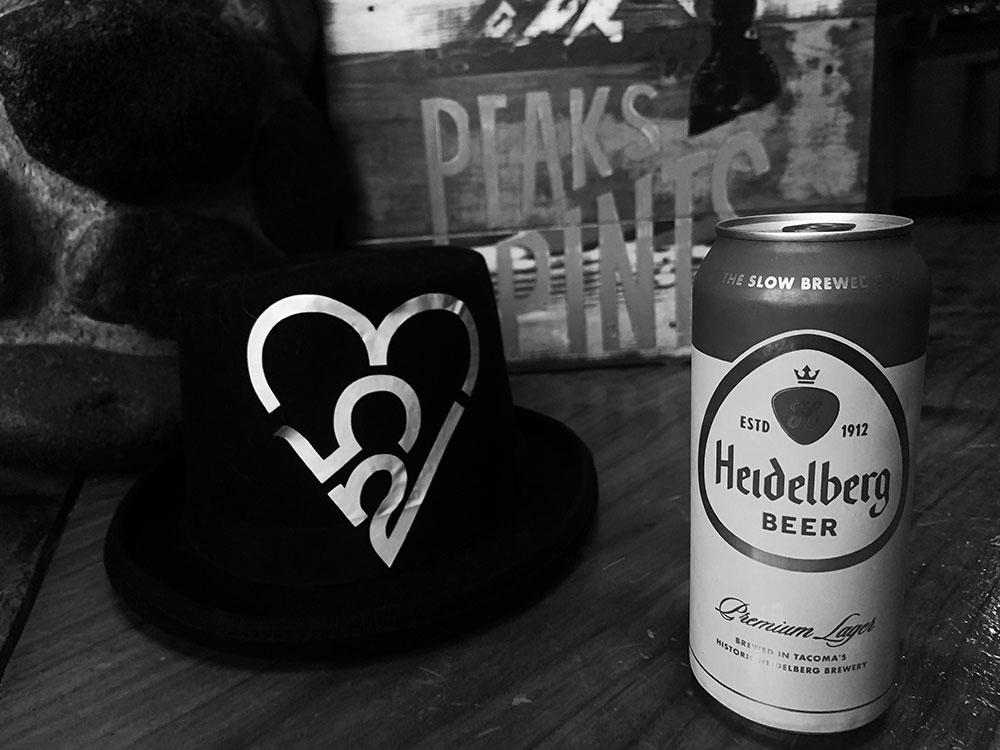 Heidelberg Premium Lager
Heidelberg Premium Lager
4% ABV
In 1901, a year after German-born brewmaster Emil Kliese leaves the Capital Brewing Co. in Tumwater, he opens the Columbia Brewing Company at 21st and South C Street in Tacoma. Kliese and his business partner, William C. Kiltz, who becomes the sales manager, build a five story, wooden frame building over an artesian well. The crank out 50 barrels a day to service 95 bars in Tacoma. Pacific Brewing & Malting invests in the brewery. They brew Columbia, Golden Drop, and Old Pilsner. In 1912, Columbia Brewing introduces Heidelberg Beer. A beer “brewed after the Munich type of brewing that has delighted connoisseurs of Europe.” Each bottle came wrapped in a fine yellow paper and was available at the price of $1.10 for a dozen 16-ounce bottles. It quickly became a top seller. Washington state prohibition of the manufacture and sale of liquor begins Jan. 1, 1916 — four years before the 18th Amendment to the U.S. Constitution went into effect Jan. 17, 1920. In 1932, Elmer E. Hemrich and a group of other Seattle investors established Columbia Breweries, Inc. and purchased the old Columbia Brewery for $100,000. The 21st Amendment is fully ratified on Dec. 5, 1933. Federal laws enforcing Prohibition were then repealed. Prohibition officially comes to an end at 12 a.m. on May 7th, 1933. Thousands of people gather at the Columbia brewery at midnight to try and get their first taste of Heidelberg in over 17 years. In 1934, Columbia Brewmaster Otto Birkmaier recommends revamping the original 1912 Alt Heidelberg label to reflect the return of pre-prohibition strength beer. The “Student Prince” becomes the brewery’s symbol. Tacoma sculptor Karl Biber sculpts the image for above the brewery’s main entrance. In 1936, Columbia is the first Pacific Northwest brewery to introduce canned beer, Alt Heidelberg Guest Beer. In 1949, Columbia Breweries, Inc. was restructured, changing its name to the Heidelberg Brewing Co., but choosing to continue doing business as Columbia Breweries. July 15, 1953, Columbia Breweries states, “What were we thinking” and officially adopts the name of Heidelberg Brewing Company. At this time, they chose to drop the “Alt” from their flagship brand simplifying it to just Heidelberg Beer. In 1958, Carling Brewing Co. of Canada purchases the Heidelberg Brewing Co. for $3.5 million. In 1979, mass consolidation within the brewing industry shutters the Heidelberg Brewery. Heidelberg would continue to be brewed for a short time in Seattle and Olympia before disappearing off the shelves. In June, 2011, the Columbia-Heidelberg Brewery brewhouse is demolished. In August 2016, Mike Runion and Travis Guterson open their 80,000-square-foot new 7 Seas brewery and taproom in a downtown Tacoma building where Heidelberg Brewery previously bottled and shipped its beer. In 2021, the duo relaunched the Heidelberg brand canning their version premium lager similar and canning it like the original Heidelberg brewery. Brewed with mostly malted barley, with some rice and corn, and Old-World hops, Heidelberg Premium Lager is crisp, clean, and quaffable. Dec. 5, 2023, Peaks & Pints writes the longest beer blurb in its history.
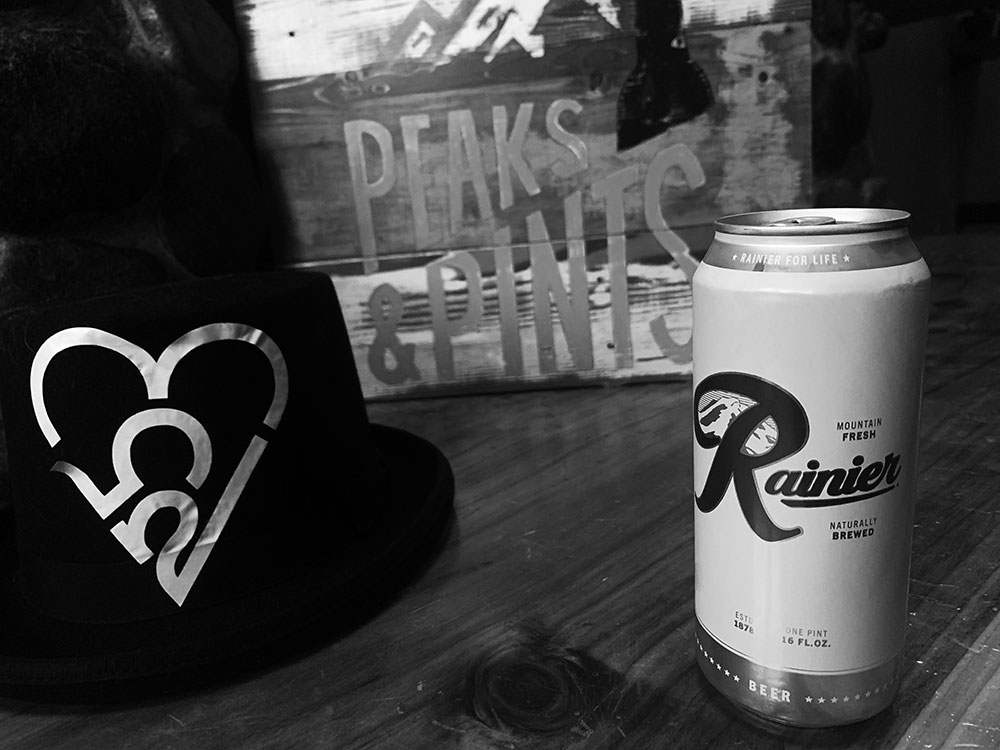 Rainier Beer
Rainier Beer
4.73% ABV
In 1883, Andrew Hemrich and partner John Kopp established Bay View Brewery in Seattle’s Georgetown neighborhood. Ten years later, Bay View Brewery joined with the breweries of Albert Braun and Claussn-Sweeney to form a new association, the Seattle Brewing & Malting Company. The brand name eventually chosen for the company’s flagship beer was “Rainier.” The Bay View plant continued to operate, and in 1906 added a bottling shop and additional refrigeration. By 1905 production of Rainier Beer reached 300,000 barrels per annum. The company employed more than 300 men, and there was room to build worker homes beside the Duwamish River that then still curved through Georgetown. Kopp and Hemrich produced Rainier beer in Washington until 1916, when the state of Washington enacted its own prohibition, four years before the 18th Amendment enacted the nationwide prohibition. Following the repeal of the Prohibition, the brewery was purchased by Lethbridge, Alberta brewers Fritz and Emil Sick, who then repurchased the Rainier brand and began brewing Rainier back in Seattle in 1935. Today, Pabst Brewing Co. brews Rainier Beer with a satisfying malty flavor over a slightly fruity background, spiced with Chinook, Mt. Hood, and Willamette hop notes.
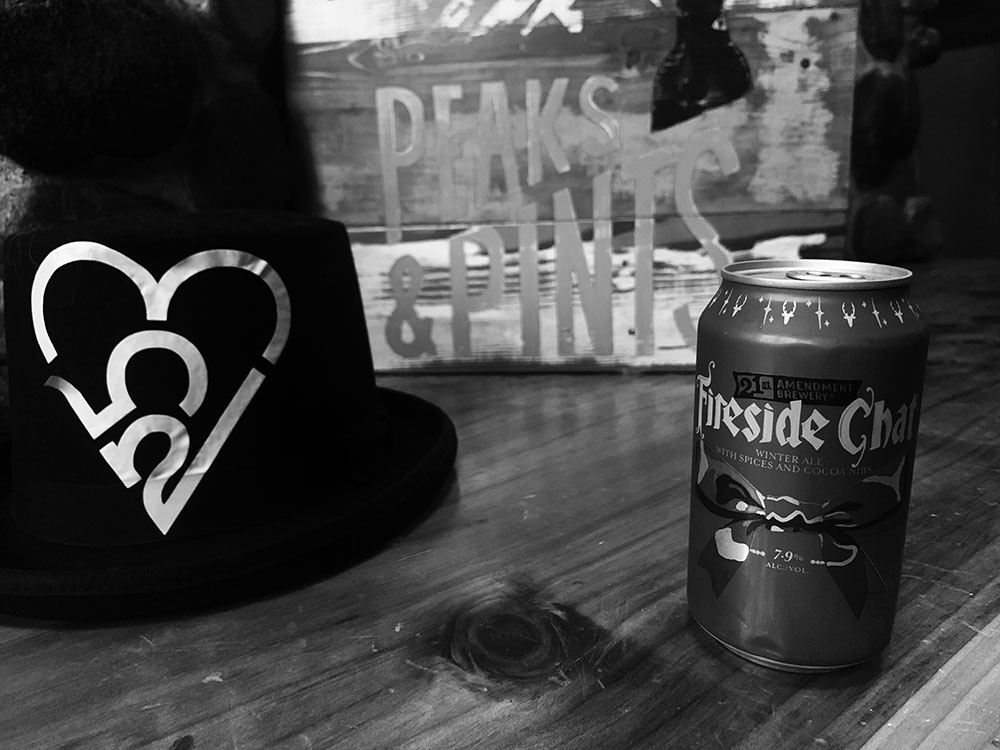 21st Amendment Fireside Chat
21st Amendment Fireside Chat
7.9% ABV, 45 IBU
In 2000, Nico Freccia and Shaun O’Sullivan touched down in San Francisco’s historic South Park neighborhood and called it 21st Amendment Brewery (the 21st Amendment, as any dedicated drinker would know, is the one that repealed Prohibition). The brewery produces a line of very tasty brews including Fireside Chat, a winter ale with a nod toward Franklin Delano Roosevelt’s Depression-era radio addresses. (Franklin Roosevelt won the 1932 presidential election based on his promise to repeal the 18th Amendment. He did so incrementally, beginning by legalizing the sale of beer, and ending with the 21st Amendment, the first and only time an amendment to the Constitution has ever been repealed.) On the nose, all the typical winter warmer flavors are accounted for: roasted malts, cinnamon, ginger, caramel, clove, and a smidgen of orange peel. Big notes of cinnamon and ginger lie in wait up front, with a touch of subtle orange peel and some clove with a big ginger sendoff, washing in some cinnamon, bread notes and subtle chocolate, too.
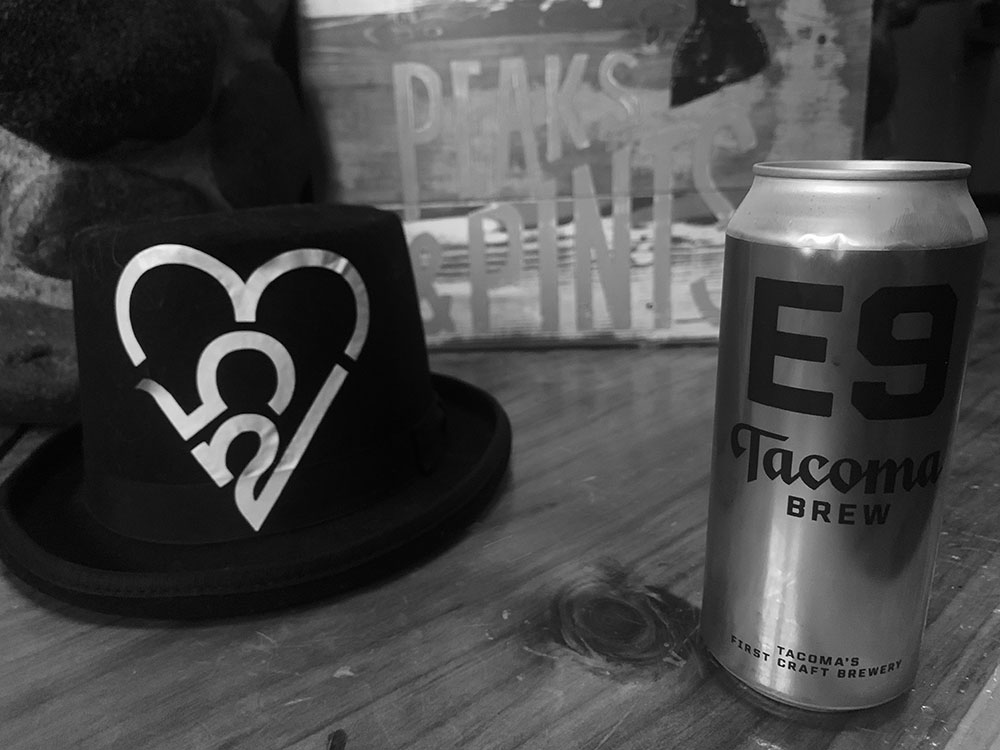 E9 Tacoma Brew
E9 Tacoma Brew
5.1% ABV, can
Columbia Brewing Co. brewed Tacoma Brew in the late 1800s in Tacoma’s now Historic Brewery District. Beer made at the facility gained national attention for its flavor and smooth aftertaste in the early 1920s, prompting the brewery to double in size and increase capacity by the mid-1930s. Success at the plant got the attention of another brewery, Heidelberg Brewing Co., which purchased the Columbia plant in 1949 and set out for another round of remodeling. The facility was bought yet again a decade later by Carling Brewery, making it the only West Coast holding of the otherwise East Coast beer company. The brewery is long gone but Tacoma Brew, a Kolsch, is still being brewed. Tacoma’s Engine House No. 9, now E9 Brewing located in Tacoma’s Historic Brewing District, bought the recipe for the breweries’ “Tacoma” brew, and still serves it many, many years after the originating brewery held its last call. Tacoma’s first beer has a medium body accentuated with crisp Northwest hops.
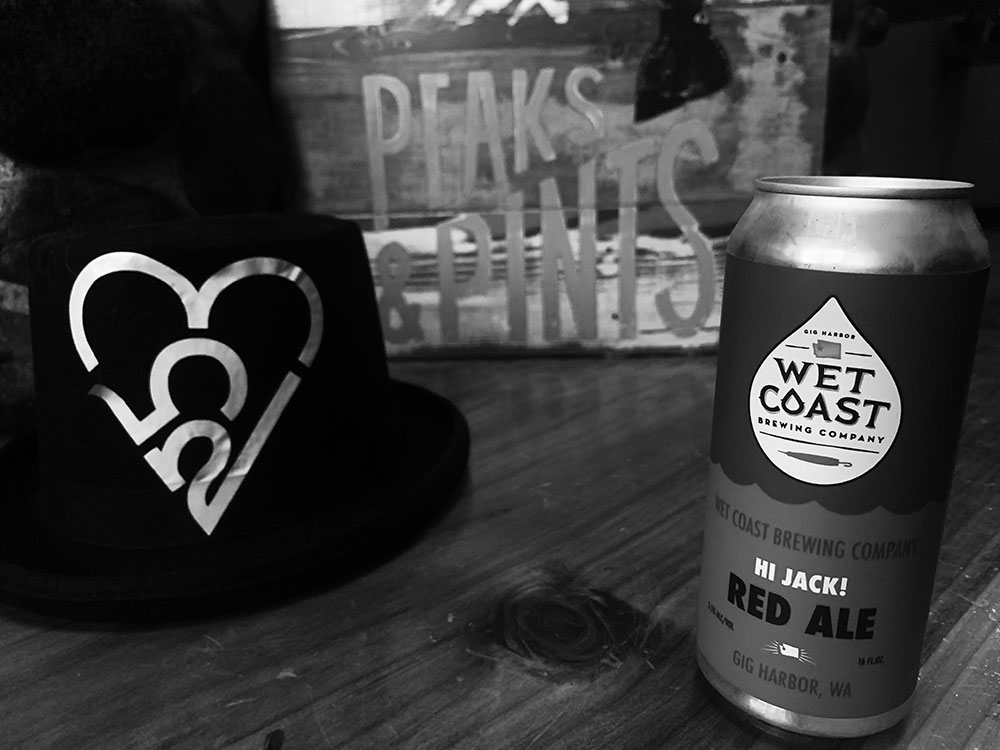 Wet Coast Hi Jack! Red Ale
Wet Coast Hi Jack! Red Ale
5.5% ABV
Wet Coast Brewing‘s name is a triple entendre: 1. West Coast, 2. Northwest weather, 3. Prohibition, where citizens voted wet or dry. In 1920, the United States has just enacted the Volstead Act, prohibiting the production and consumption of intoxicating liquors. Bottles were smashed, babies cried, and Americans everywhere were forced to be “dry” and live a life without beer. That is, everywhere but Washington state. Lt. Roy Olmstead with the Seattle Police Department began smuggling alcohol from Canada and soon enough Washington wouldn’t just be a rainy state out west, it would become the Wet Coast. Many Wet Coast beers give a nod to Prohibition days, including Hi Jack!, which was used in speakeasies as a code word for law enforcement. Hi Jack!, the red ale, is brewed with Crystal and Black malts for a deep red hue and smooth body. Centennial hops provide floral and citrus notes with a small amount of bitterness to balance the beer.
LINK: Peaks & Pints beer and cider cooler inventory
